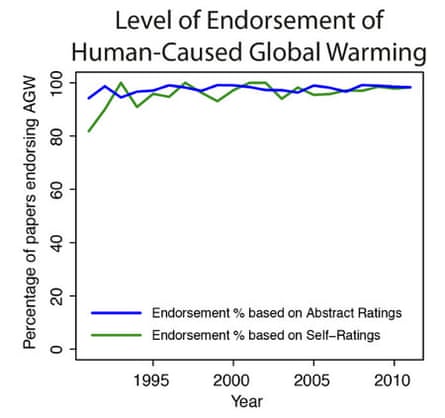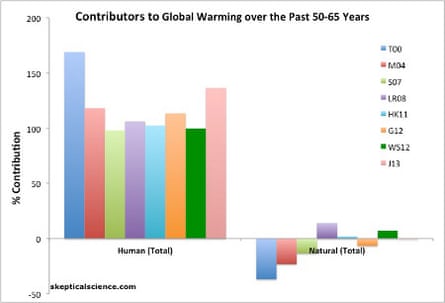Our team of citizen science volunteers at Skeptical Science has published a new survey in the journal Environmental Research Letters of over 12,000 peer-reviewed climate science papers, as the Guardian reports today. This is the most comprehensive survey of its kind, and the inspiration of this blog's name: Climate Consensus – the 97%.
The survey
In 2004, Naomi Oreskes performed a survey of 928 peer-reviewed climate papers published between 1993 and 2003, finding none that rejected the human cause of global warming. We decided that it was time to expand upon Oreskes' work by performing a keyword search of peer-reviewed scientific journal publications for the terms 'global warming' and 'global climate change' between the years 1991 and 2011.
Our team agreed upon definitions of categories to put the papers in: explicit or implicit endorsement of human-caused global warming, no opinion, and implicit or explicit rejection or minimization of the human influence, and began the long process of rating over 12,000 abstracts.
We decided from the start to take a conservative approach in our ratings. For example, a study which takes it for granted that global warming will continue for the foreseeable future could easily be put into the implicit endorsement category; there is no reason to expect global warming to continue indefinitely unless humans are causing it. However, unless an abstract included language about the cause of the warming, we categorized it as 'no opinion'.
Each paper was rated by at least two people, and a dozen volunteers completed most of the 24,000 ratings. The volunteers were a very internationally diverse group. Team members' home countries included Australia, USA, Canada, UK, New Zealand, Germany, Finland, and Italy.
We also decided that asking the scientists to rate their own papers would be the ideal way to check our results. Who knows what the papers say better than the authors who wrote them? We received responses from 1,200 scientists who rated a total of over 2,100 papers. Unlike our team's ratings that only considered the summary of each paper presented in the abstract, the scientists considered the entire paper in the self-ratings.
The results
Based on our abstract ratings, we found that just over 4,000 papers took a position on the cause of global warming, 97.1% of which endorsed human-caused global warming. In the scientist self-ratings, nearly 1,400 papers were rated as taking a position, 97.2% of which endorsed human-caused global warming. Many papers captured in our literature search simply investigated an issue related to climate change without taking a position on its cause.
Our survey found that the consensus has grown slowly over time, and reached about 98% as of 2011. Our results are also consistent with several previous surveys finding a 97% consensus amongst climate experts on the human cause of global warming.

Why is this important?
Several studies have shown that people who are aware of scientific consensus on human-caused global warming are more likely to support government action to curb greenhouse gas emissions. This was most recently shown by a paper just published in the journal Climatic Change. People will generally defer to the judgment of experts, and they trust climate scientists on the subject of global warming.
However, vested interests have long realized this and engaged in a campaign to misinform the public about the scientific consensus. For example, a memo from communications strategist Frank Luntz leaked in 2002 advised Republicans,
"Should the public come to believe that the scientific issues are settled, their views about global warming will change accordingly. Therefore, you need to continue to make the lack of scientific certainty a primary issue in the debate"
This campaign has been successful. A 2012 poll from US Pew Research Center found less than half of Americans thought scientists agreed humans were causing global warming. The media has assisted in this public misconception, with most climate stories "balanced" with a "skeptic" perspective. However, this results in making the 2–3% seem like 50%. In trying to achieve "balance", the media has actually created a very unbalanced perception of reality. As a result, people believe scientists are still split about what's causing global warming, and therefore there is not nearly enough public support or motivation to solve the problem.
Check our results for yourself
We chose to submit our paper to Environmental Research Letters because it is a well-respected, high-impact journal, but also because it offers the option of making a paper open access, free for anyone to download.
We have also set up a public ratings system at Skeptical Science where anybody can duplicate our survey. Read and rate as many abstracts as you like, and see what level of consensus you find. You can compare your results to our abstract ratings, and to the author self-ratings.
Human-caused global warming
We fully anticipate that climate contrarians will respond by saying "we don't dispute that humans cause some global warming." First, there are a lot of people who do dispute that humans cause any global warming. Our paper shows that their position is not supported in the scientific literature.
Most papers don't quantify the human contribution to global warming, because it doesn't take tens of thousands of papers to establish that reality. However, as noted above, if a paper minimized the human contribution, we classified that as a 'rejection'. For example, if a paper were to say "the sun caused most of the global warming over the past century," that would be included in the less than 3% of papers rejecting or minimizing human-caused global warming.
Many studies simply defer to the expert summary of climate science research put together by the Intergovernmental Panel on Climate Change (IPCC), which says that most of the global warming since the mid-20th century has been caused by humans. And according to recent research, that statement is actually too conservative. Of the papers which specifically examine the contributors to global warming, they virtually all conclude that humans are the dominant cause over the past 50 to 100 years.

Most studies simply accept this fact and go on to examine the consequences of this human-caused global warming and associated climate change.
Another important point is that once you accept that humans are causing global warming, you must also accept that global warming is still happening. We cause global warming by increasing the greenhouse effect, and our greenhouse gas emissions just keep accelerating. This ties in to the fact that as recent research has showed, global warming is accelerating. If you accept that humans are causing global warming, as over 97% of peer-reviewed scientific papers do, then this conclusion should not be at all controversial. Global warming cannot have suddenly stopped.
Spread the word
Given the importance of the scientific consensus on human-caused global warming in peoples' decisions whether to support action to reduce greenhouse gas emissions, and the public lack of awareness of the consensus, we need to make people aware of these results. To that end, design and advertising firm SJI Associates generously created a website pro-bono, centered around the results of our survey. The website can be viewed at TheConsensusProject.com, and it includes a page where consensus graphics can be shared via social media or email. Skeptical Science also has a new page of consensus graphics.
Quite possibly the most important thing to communicate about climate change is that there is a 97% consensus amongst the scientific experts and scientific research that humans are causing global warming. Let's spread the word and close the consensus gap.






Comments (…)
Sign in or create your Guardian account to join the discussion